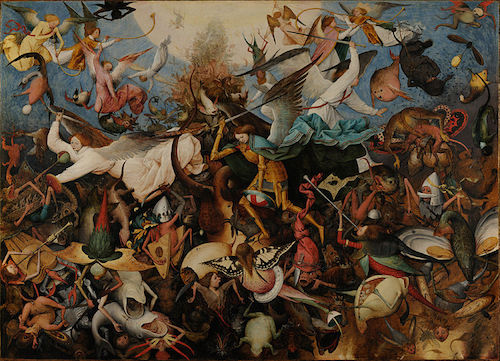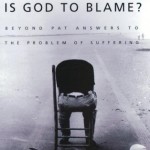We run our website the way we wished the whole internet worked: we provide high quality original content with no ads. We are funded solely by your direct support. Please consider supporting this project.

Theology That Accounts for Terrorism
The general assumption of both the Old and the New Testaments is that the earth is virtually engulfed by cosmic forces of destruction, and that evil and suffering are ultimately due to this diabolical siege. Jesus defined himself and his ministry in terms of aggressively warring against Satanic forces. Both he and his disciples recognized that he had come to destroy the devil and his works.
In this light, it is quite peculiar that after Augustine, throughout the church’s history up to the present, very few thinkers conceived of Satan as being in any way relevant to, let alone central to, the solution of the problem of evil. In terms of arriving at an ultimate explanation for evil, after Augustine the question always gets filed under the category of God’s providence instead of under the category of spiritual warfare, that is under the topic of what Satan and rebel angel and fallen humans freely choose to do against God’s will.
With Augustine it becomes a problem of understanding evil as a part of God’s will.
By contrast, the NT and the early postapostolic church always thought of the world as being caught up in a cosmic battle and thus as saturated with horrifying suffering and diabolical evil. That is the final explanation for evil. While the NT and the early church fathers taught that God is the final “why” as to the existence of all things, after Augustine, it is assumed that God is the final “why” for how these things and beings existed.
But the NT locates the ultimate “why” of evil actions in the angelic or human beings who bring about those actions.
In a state of war, bullets fly, bombs explode, mines are stepped on, and children are maimed. War is hell. This is expected. The only real problem is in confronting the evil and in overcoming it.
At the same time, the warfare worldview is admittedly not a worldview that many modern people find easy to accept. To many contemporaries, the notion is preposterous that real, semi-autonomous, self-determining and invisible spirits exist that can and do influence our lives. The whole thing sounds more like something out of a Star Wars movie than like serious contemporary theology.
One of the primary reasons that this is the case is due to the adoption of a model of divine perfection, which was derived form Hellenistic philosophy by Augustine and other thinkers in the church.
For example, from Plato, Aristotle, and the subsequent Hellenistic tradition, the church arrived at the notion that God was altogether unmoved, impassible, immutable, nontemporal and purely actual. Yet it is precisely these features of the church’s doctrine of God that undermines the warfare worldview. On the basis of this model of God, a meticulous, sovereign, divine blueprint was postulated to encompass all temporal events, including the idea of a cosmic war with evil.
This, however, renders the war a sham. For a war that meticulously follows a blueprint that has been drawn up by one of the parties involved in the war (God) is hardly a real war.
—Adapted from God at War, pages 55-67
Image: The Fall of the Rebel Angels, by Pieter Bruegel the Elder
Related Reading

Old Testament Support for the Warfare Worldview
Rebuking Hostile Waters Satan plays a minor role in the Old Testament relative to the New Testament. Instead, the warfare worldview in the Old Testament is expressed in terms of God’s conflict with hostile waters, cosmic monsters, and other gods.Like their Ancient Near Eastern neighbors, ancient Jews believed that the earth was founded upon and…

Quotes to Chew On: Prayer and Finitude
“We pray as we live: in a sea of ambiguity. This is not because we are fallen but because we are finite. And we are inclined to forget we are finite. We ignore the ambiguity that accompanies our finitude, and thus we claim to know what we can’t know. We reduce the unfathomable complexity of…

Sermon Clip: God In The Gallows
Greg has recently returned from a three week trip in Europe, and today he shares stories of how the Kingdom message of a Jesus-looking God, radical love and non-violence is truly spreading all over the world. You can view the full sermon here: http://whchurch.org/sermons-media/sermon/god-in-the-gallows

Possibility of Love
In this video, Greg explores the core sin that stands in the way of love. You might be surprised by what it is. Video by The Work of the People

Resisting Evil
The New Testament refers to Satan as the “god of this age” and the “ruler of the power of the air” (2 Cor 4:4; Eph.2:2). In the first century Jewish worldview, “air” referred to the domain of spiritual authority over the earth. The author, Paul, was thus saying that the spiritual environment of the earth…

Some Questions a Year After Her Child’s Death
Jessica Kelley wrote a post for The Jesus Event that we wanted to share with you. You might remember that last year we were getting to know Jessica as she lost her four year old son Henry just before Christmas. In this post, she reflects on the theology of the people around her concerning her son’s death. She has…
